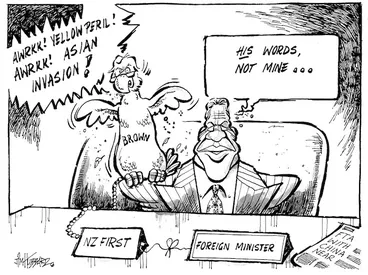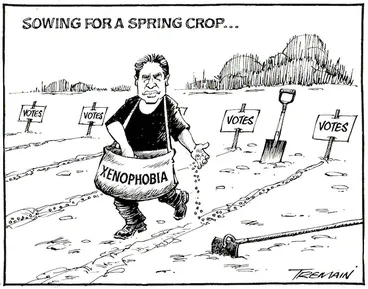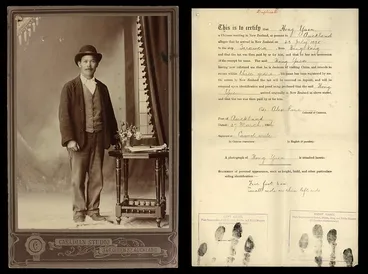Chinese New Zealanders: Legislation and policy enacted against Chinese in New Zealand
A DigitalNZ Story by National Library Services to Schools
There have been waves of anti-Chinese prejudice in Aotearoa NZ predating the arrival of Chinese miners in the 1860s and continuing through to the 20th century and beyond. One of the most notorious measures was the introduction of the poll tax.
Poll tax certificate stub
Manatū Taonga, the Ministry for Culture and Heritage
BACKGROUND
Chinese have been in Aotearoa New Zealand since 1842, but the community really grew after the first Chinese miners were invited to the Otago goldfields in 1865. While anti-Chinese feelings emerged soon after the Chinese arrival, it was not until 1881 that the New Zealand Government introduced its first piece of legislation to restrict Chinese immigration.
CONTENTS
The poll tax (Chinese Immigrants Act 1881)
A history of the poll tax
Papers Past articles relating to the discrimination of Chinese
Other anti-Chinese laws
A poll tax apology
Late 20th-century anti-Asian politics
Supporting resources
Glossary
THE POLL TAX (Chinese Immigrants Act 1881)
Ignorance and prejudice meant that the Chinese were seen as undesirable – a number of harsh laws limited their rights in New Zealand. To restrict immigration, in 1881 the government charged them a poll tax (entry fee) of £10, later raised to £100. This taxation continued until 1934. In 2002, the government apologised for the hardship it had caused.
Source: Chinese, Te Ara — the Encyclopedia of New Zealand.
The first restrictions on immigration
Manatū Taonga, the Ministry for Culture and Heritage
The Chinese showed much agency in protesting vigorously against the legislation. In 1883 there was a petition from John Ah Tong and 166 others against the poll tax. In part, it states:
“The Chinese residents in New Zealand have heretofore proved themselves industrious, inoffensive and law-abiding people…”
Source: Being Chinese in Aotearoa in the 1890s.
The petition was the first of many appeals to the Government. In highlighting the injustice, the protests often cited international treaty law and the value Chinese brought to the wider community.
To view the act see, Chinese Immigrants Act 1881.
Chong Ngan, age 18, arrived aboard the Maheno. His certificate was issued 14/2/1922. He paid a £100 poll-tax.
1881 Poll Tax
Archives New Zealand Te Rua Mahara o te Kāwanatanga
Sing Yu Wu (born at Canton) arrived in NZ 1923 and paid the £100 poll-tax.
Sing Yu Wu, 1923
Archives New Zealand Te Rua Mahara o te Kāwanatanga
On 30 September 1924 Moon Kow Shum paid a £100 poll-tax when he arrived in New Zealand.
Moon Kow Shum, 1924
Archives New Zealand Te Rua Mahara o te Kāwanatanga
Chinese portraits
All Chinese who wanted to leave Aotearoa New Zealand temporarily had to apply to the Government for a poll tax exemption on their return. Part of the paperwork included photos (such as those above). These images were taken between 1904 and 1956.
Prior to photography, fingerprints were required to ascertain the identity of the certificate bearers. Some certificates also have the initial application attached, or correspondence about the individual concerned.
The whole certificate image series has been digitised by Archives New Zealand under Chinese portraits.
A HISTORY OF THE POLL TAX
Although Chinese miners had been welcomed when there was a shortage of labour, anti-Chinese prejudice soon resurfaced. By 1871 there were calls for Chinese immigration to be restricted. Like the other British colonies of Canada and Australia, New Zealand imposed an entry tax on Chinese immigrants. The Chinese Immigrants Act of 1881 introduced a ‘poll tax’ of £10. The act also imposed a restriction on ships’ passengers – one Chinese passenger per 10 tons of cargo. In 1896 the ratio was reduced to one passenger per 200 tons of cargo, and the poll tax was increased to £100.
Source: Chinese — Later settlement, Te Ara - the Encyclopedia of New Zealand.
The stub of a poll tax certificate
Manatū Taonga, the Ministry for Culture and Heritage
Young, Steven, 1948- : Poll tax certificates
Alexander Turnbull Library
Poll tax imposed on Chinese
Manatū Taonga, the Ministry for Culture and Heritage
The Rest is History: The Poll Tax
Radio New Zealand
PAPERS PAST ARTICLES RELATING TO THE DISCRIMINATION OF CHINESE
CHINESE IN NEW ZEALAND. (Taranaki Herald, 04 December 1907)
National Library of New Zealand
ANTI-ASIATIC LEAGUE. (Evening Post, 08 May 1907)
National Library of New Zealand
THE CHINESE (Bruce Herald, 21 August 1888)
National Library of New Zealand
A PLEA FOR THE CHINESE. (Auckland Star, 24 April 1899)
National Library of New Zealand
OTHER LAWS ENACTED AGAINST CHINESE
The poll tax was the most notorious in a long list of legislative measures, which included the following restrictions:
After 1907 all arrivals were required to sit an English reading test.
Naturalisation of Chinese was stopped in 1908 and did not resume until 1952.
From 1908 Chinese who wished to leave the country temporarily needed re-entry permits, which were thumbprinted.
From 1920 entry to New Zealand was by permit only, which severely restricted the numbers of Chinese immigrants.
Permanent residency was denied from 1926.
Chinese people were deprived of the old age pension until 1936.
The Chinese protested against these injustices, petitioning Parliament for just treatment and legal reform.
Source:Chinese — Later settlement, Te Ara - the Encyclopedia of New Zealand.
Anti-immigrant cartoon, 1925
Manatū Taonga, the Ministry for Culture and Heritage
Attacking Chinese
Manatū Taonga, the Ministry for Culture and Heritage
ANTI-ASIATIC LEAGUE. " Nothing but a heavy poll-tax will suit me" (New Zealand Free Lance, 24 August 1907)
National Library of New Zealand
A POLL TAX APOLOGY
At the Chinese New Year celebration on 12 February 2002, Prime Minister Helen Clark made this statement:
I wish to announce today that the government has decided to make a formal apology to those Chinese people who paid the poll tax and suffered other discrimination imposed by statute and to their descendants. With respect to the poll tax we recognise the considerable hardship it imposed and that the cost of it and the impact of other discriminatory immigration practices split families apart. Today we also express our sorrow and regret that such practices were once considered appropriate.
Source: Immigration regulation — 1986–2003: Selection on merit, Te Ara - the Encyclopedia of New Zealand.
NZ government apologises to Chinese community
Services to Schools
20th-century anti-Chinese legislation
Manatū Taonga, the Ministry for Culture and Heritage
LATE 20TH-CENTURY ANTI-ASIAN POLITICS
Community concern
Changes to immigration policy in 1986 and 1987 based the selection of immigrants on skills, not country of origin. There was a significant increase in immigration from Asia. The first wave of arrivals in the early 1990s were mainly from Hong Kong, Taiwan and South Korea. After 2000, China and India provided many immigrants. In 2013, nearly 12% of New Zealand's population was Asian. In 1993 Auckland community newspapers published articles by journalists Pat Booth and Yvonne Martin on the ‘Inv-Asian’. A number of groups formed to oppose Asian immigration.
There was concern about a range of issues – everything from the driving abilities of Asians to the impact of non-English speakers on schools. Much public comment echoed the ‘yellow peril’ concerns of a century earlier.
Source: Ethnic and religious intolerance — Anti-Asian politics, Te Ara - the Encyclopedia of New Zealand.
"AWRKK! Yellow peril! AWRKK! Asian invasion!" "His words, not mine..." 8 April, 2008
Alexander Turnbull Library
Sowing for a spring crop. 17 August 2005.
Alexander Turnbull Library
Hong Yuen
Archives New Zealand Te Rua Mahara o te Kāwanatanga
SUPPORTING RESOURCES
The poll tax
Chinese Poll Tax Heritage Trust — the Chinese Poll Tax Heritage Trust delivers funding rounds to support activities promoting the preservation and awareness of Chinese New Zealand history.
Joe Lum vs Attorney General — Joe Lum takes the govt to court over their attempts to make his New Zealand-born children pay the poll tax.
The mixed blessing of a fingerprint— Archives New Zealand is connecting Chinese New Zealanders with their ancestors by digitally imaging the poll-tax certificates that are a record of their entry into Aotearoa New Zealand.
NZ government apologises to the Chinese community — the government's poll-tax apology marks a new beginning for Aotearoa New Zealand.
Poll tax imposed on Chinese — the Chinese Immigrants Act, introduced a ‘poll tax’ of £10 (equivalent to nearly $1700 today) on Chinese migrants and restricted the number allowed to land from each ship arriving in New Zealand.
General
Asian invasion — Tze Ming Mok's visual online record of the Pat Booth newspaper article and other communities’ media responses.
Chinese New Zealanders — racism against Chinese in New Zealand has a long history that dates from the 1870s to recent times. This article tracks this racism, why the Chinese came to New Zealand, and how things have changed.
NZ’s racism against Asians — people’s views on racism are largely dependent on their own personal experience and identity: for the first generation of immigrants from China, they often find New Zealand is their adopted country with no systematic discrimination.
Racist killing in Wellington's Haining St — the 1905 murder of Joe Kum Yung by a white supremacist in Wellington highlighted the hatred some felt towards New Zealand’s Chinese community.
Racist revival — the first wave of Chinese immigrants to New Zealand were greeted with fear and suspicion from the white settler community. 130 years later (1993) the racist policies of late 19th century New Zealand are gone, but old attitudes linger.
COVID-19 and anti-Asian sentiment
These resources cover the impact of the COVID-19 pandemic on New Zealand Chinese communities, 2020-2022.
Anti-Asian sentiment in NZ — in February 2021, a Human Rights Commission Report done to explore the effect of Covid-19 found that Chinese communities, along with Māori, reported the highest rates of discrimination.
Coronavirus outbreak — calm urged as anti-Chinese sentiment felt in New Zealand.
Covid-19 — Māori, Chinese communities report most discrimination during the pandemic.
Older Chinese immigrants suffered racial discrimination during the COVID-19 pandemic — nearly 20 percent of older Chinese immigrants in Auckland experienced racial discrimination during the COVID-19 pandemic, according to new research from Massey University.
Online comics: The Pandemic Chronicles — these online comics offer a glimpse into the experiences of people of ethnic Chinese background who lived through the Covid-19 pandemic in Aotearoa New Zealand.
A qualitative study — older Chinese and Korean migrants' experiences of the first COVID-19 lockdown in Aotearoa New Zealand.
An instance of racist vandalism which occurred in Upper Hutt, Wellington between 31 April and 1 May 2020.
Racist graffiti on community noticeboard, Upper Hutt
Museum of New Zealand Te Papa Tongarewa
GLOSSARY
Definitions below have been taken from the Oxford Learner’s Dictionary and Te Aka, the Māori dictionary.
agency — as a result of the action of somebody/something.
campaigned — to take part in or lead a campaign, for example to achieve social or political change, or in order to win an election.
exemption — official permission not to do something or pay something that you would normally have to do or pay.
industrious — working hard; busy.
naturalisation — the process of making somebody who was not born in a particular country a citizen of that country.
petition — a written document signed by a large number of people that asks somebody in a position of authority to do or change something.
prejudice — an unreasonable dislike of or preference for a person, group, custom, etc., especially when it is based on their race, religion, sex, etc.
residency — permission to live in a country that is not your own.
taxation — the system of collecting money by taxes.
thumbprinted — to make a record of somebody's fingerprint.
vigorously — in a way that is very active, determined or full of energy.
This story was curated and compiled by Te Puna Mātauranga o Aotearoa | National Library of New Zealand, Services to Schools staff, 2023. We acknowledge the content, research, guidance, and review provided by Kirsten Wong for the New Zealand Chinese Association, Lynette Shum, and Emeritus Professor Dr Manying Ip.
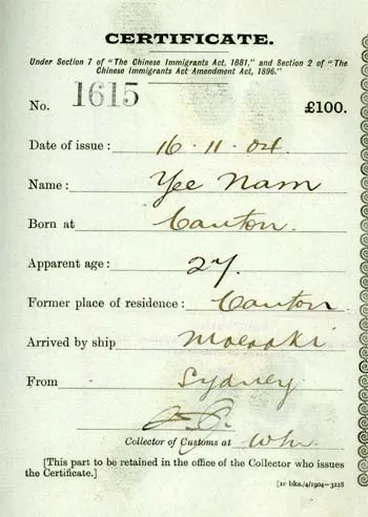
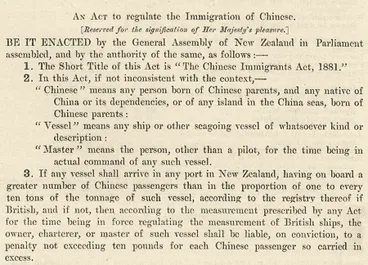
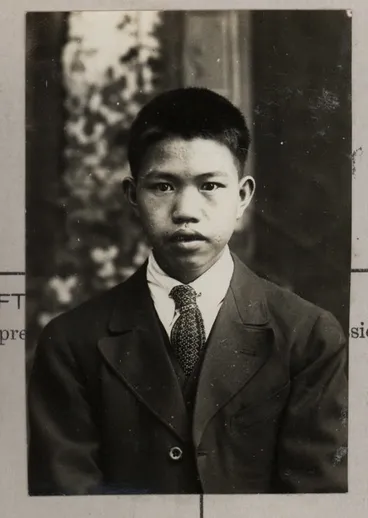
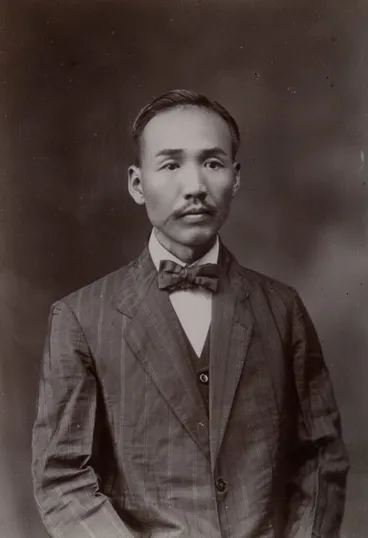
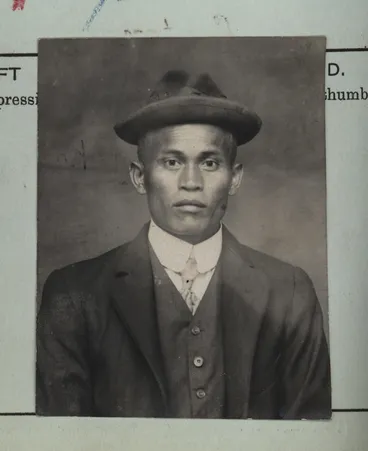
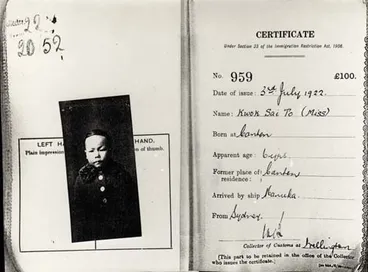
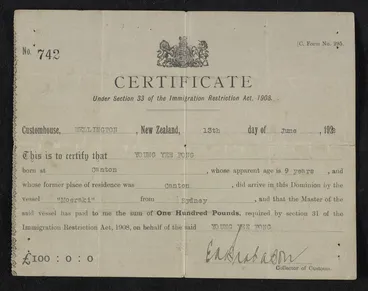
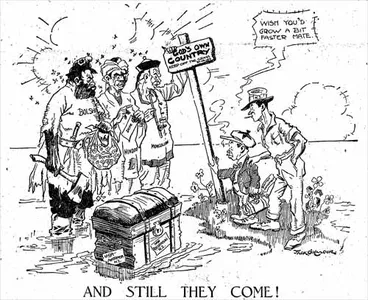
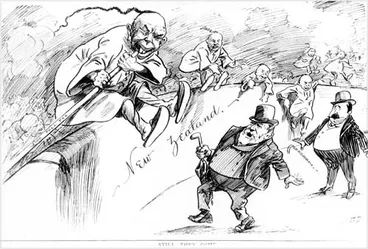
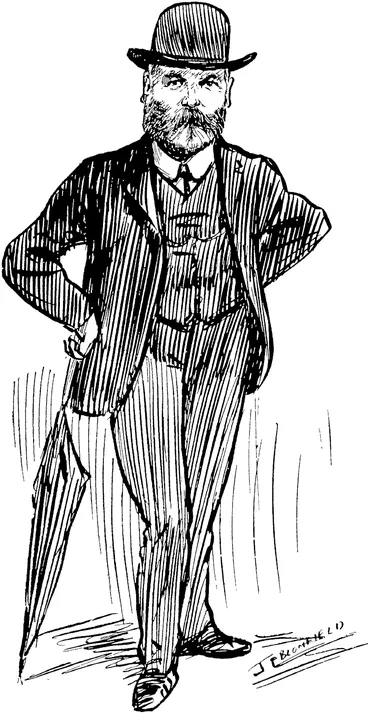
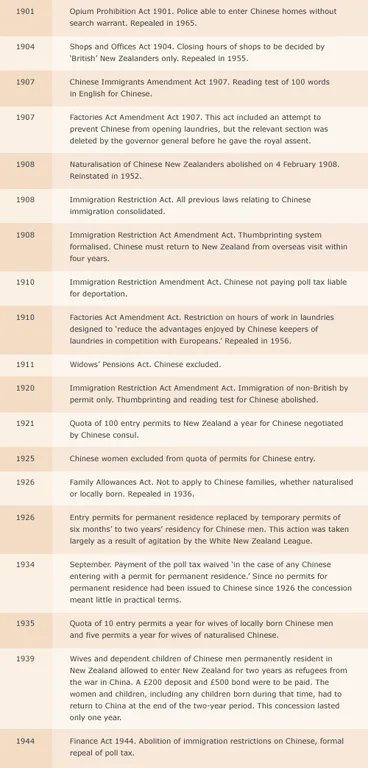
![Scott, Thomas, 1947- :No nukes ; Save the whale ; Ratify the Treaty ; Feed the poor ; Equality 4 [women] ; Asians go home!! 17 May 1993! Image: Scott, Thomas, 1947- :No nukes ; Save the whale ; Ratify the Treaty ; Feed the poor ; Equality 4 [women] ; Asians go home!! 17 May 1993!](https://images.digitalnz.org/cLW5Q9VFlLrjx016Gl5N2EWifCM=/368x0/https%3A%2F%2Fndhadeliver.natlib.govt.nz%2FNLNZStreamGate%2Fget%3Fdps_pid%3DIE236107)
